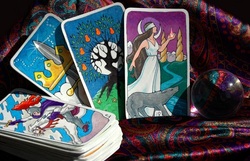 While a good Tarot reader can give you some incredible insight into your life, one of the most important things about a reading is your approach. When you're looking for some guidance, remember that few things matter as much as the question you ask.
When my clients sit with me, they're often a bit confused about what would be the best subject for a reading. I've been given several different options and told to pick, or given no options and told to simply explain what I see in the cards. Some clients even give a list of everything on their minds, even when those subjects aren't closely related.
I totally understand the confusion. There are all kinds of readers, and a bunch of different approaches. I've had readers that used an all-purpose spread to cover every possible subject in twenty minutes. I've had one who immediately began talking to her spirit guides, and only drew a single card in the last few minutes. (I confess I felt a little cheated by that one - I had paid for a Tarot reading, not a channeling!) It's easy to assume that because a lot of Tarot readers work with psychic abilities, or simply with their intuitive response to the cards, that they can pick out what you need to know just by glancing at you.
But in my experience, the best readings come from having the best questions: questions that are clear, focused, and open to a lot of different information. So here are five basic tips for asking the best question for your reading, and receiving the best results!
1) Make your question clear and specific.
If you ask me about money, there's a lot of things that could come up: your position at work, your spending habits, the results of any financial windfalls. If you ask me about the results of your business in the next six months, I'll be able to focus my reading and give you a lot of specific, useful advice via the cards.
2) Don't be afraid of not covering everything.
Most Tarot readers will read for as a little as fifteen minutes to as long as an hour. Not only is that usually time for more than one spread, and a detailed heart-to-heart about what your reading shows, but the issues in your life can be intertwined. Talking about your relationships will lead to a look at boosting your communication, or raising your self-esteem. The cards have a real knack for revealing what's hidden and bringing it into the light, so if you need to see what the real issue is, don't worry. It'll be there.
3) Don't ask about other people.
If you're asking about your relationship with another person, that's fine. But if you just want to know how they're feeling, or what's going on in their personal lives, that's not so easy. For one thing, some readers believe it's a breach of ethics to read for anyone other than the clients who've consented to it - that includes celebrities! And more importantly, there's no guarantee you'll get the answers you want. Any reading about another person will still be through your eyes, with your perspective. It might miss important details, or be clouded by your energy and bias. Try asking about your relationship with the person, or what you need to know about the situation.
4) Don't limit your possible answers.
One of the biggest things I see newbies to Tarot do is limit the scope of their answers. They'll ask a yes-or-no question, or they'll be looking for a specific result: "Will I get a boyfriend?" But part of the beauty of Tarot is how many levels and shades of meaning you can find in a reading. Depending on the spread and what cards you draw, the cards can reveal what's hidden, show different options, or tell you when you're headed for an unpleasant result so you can change your tune. The 'how' and 'why' are so much more important than the 'what' in a good reading. One of my favorite templates for this kind of question is "What do I need to know about...?" That way you can stay as broad or specific as you like, while leaving your reading open to all the detail that's possible for you.
5) Timing isn't always important.
There are definitely Tarot spreads for what will come in a specific amount of time, and how specific it can get depends on the reader. But personally, I like to keep questions of timing in a reading open-ended. The future can always be changed by our actions, so the longer you project into the future with a reading, the less accurate it has the chance to be. Tarot should be an active experience, where the path you take towards your goals is informed and enhanced by the reading. Rather than asking when something will happen, I like to ask what I can do to help bring it about, and then trust that the universe will send it to me in its own time.
Be open to all the possibilities, and your reading will surprise you by the depth of the information it will give - and all the new insight it'll open up!
I know I stress a lot about Tarot being a tool with no one right method, and how the magic is in you. Today I thought I'd put up a really great YouTube video I found by Jeanne Fiorini of TarotWorks.com, who talks about some of the traditions and superstitions behind Tarot - and how really, like I keep emphasizing, it's a set of tools meant to bring out your inner wisdom.
 There's so much more to intuitive thinking than just psychic readings and spirit guides. While that's the end goal, developing yourself and your mind so you can be more in touch with the universe, here's a few things developing your intuition can teach you along the way. (image is "Intuition" by Bente Hansen) - Pay attention. The world has so much to say to you if you look around and see what it's telling you. You have so much to say to you, if you only tune in. If you learn to listen, you'll be open to more points of view and more possibilities.
- Slow down. We're so wrapped up in the world around us that we don't always take time to really see and feel what we're doing. Slowing down puts us in touch with our own bodies, with the things we want and need - which means we can take care of ourselves in a more profound way.
- You know more than you think you do. Gurus can point you in the right direction, and you can learn a lot from an outside perspective, but ultimately you're just as in touch with inner wisdom as everyone else. If you believe you'll see results from trusting your instincts, then you will, whether that's achieving your heart's desire or learning more about yourself to make it happen.
- The world is out to give you good things. Really. Even when everything is going horribly. There are no "bad" cards in Tarot, and there are very few 100% "bad" events in life. Our mistakes and our tragedies are tools to learning and developing into something greater than we are. Listening to your intuition means you have an internal guide all the time telling you how and why that is, and it makes the true lessons of the moment far easier to access and believe.
- You are magic. Listen to your intuition, and you'll realize all the miraculous things you've seen in movies are already part of you. As you unlock more and more of your own psychic potential, you'll realize that all the incredible things you ever wanted to do were already there to begin with, waiting for you to bring them out. Will you have natural talent to be an expert at everything? No. But you'll have access to it - to learning lessons from it, tapping into it, and growing from it. And you can make anything you want a part of the magic of your world.
"And you who seek to know Me, know that the seeking and yearning will avail you not, unless you know the Mystery: for if that which you seek, you find not within yourself, you will never find it without.
For behold, I have been with you from the beginning, and I am That which is attained at the end of desire." - The Charge of the Goddess, Doreen Valiente
 If you ask witchy types what a "Fluffy Bunny" is, you'll get a hundred different answers.
They talk about white light, and the people who hate them are just cynical jerks. They talk about white light, and judge anyone who shows anger or pain. They judge spiritual paths that are too "scary". They're too accepting of just about anything in their spiritual path, without doing the proper research and work. They trust authors that are inaccurate - no one can agree on which authors, mind you, or just what the inaccuracies are .
Really, the only way I made peace with my fear of being a "fluffy bunny" was when I ignored the conversation altogether. Historical accuracy was something I could gauge, so I checked if that was up to snuff, and the rest? Whatever works for you. And it all seemed to, so why should I care?
But a few weeks ago, a conversation popped up about Tarot that brought the whole idea into my thoughts again. The heated debate went: Tarot has been used to teach spiritual mysteries, and has been part of a lot of magickal ceremonies. Now, it's mostly used for "fortune-telling". Has Tarot been turned into a fluffy New-Agey oracle? Has the "real" meaning of things been corrupted somehow?
I mainly rolled my eyes and ignored the whole thing, as more people slowly broke in: intuitive Tarot isn't as "meaningful." Just teaching the symbolism and magickal meanings aren't as "accurate." And my favorite: we all needed to "admit" that intuition wasn't real, was just an element of our imagination, that there's no such thing as psychic development. Only then can we grow spiritually.
And I thought: Seriously, guys? Seriously? You just talked about the names of God and the angelic correspondences to the Tree of Life, and you're an authority on whether something is made up or not? We work with the Platonic elements and robes and magic wands. We discuss the meaning of 78 pieces of artwork printed on card stock. Most people think we're ridiculous.
And even if you don't, and you're the most mainstream Judeo-Christian out there: someone still thinks you're just talking to imaginary friends.
The human mind is so vast, so varied, so full of thoughts and ideas. Patterns and symbols and stories, they're part of how we learn and grow. That's what Tarot is all about: seeing what story the cards tell you, and using it to inform your life and the choices you make. So unless you are flat-out inventing stuff, or appropriating cultures and passing it off as "authentic", your spiritual life? None of my business.
If you want to develop as a psychic, a witch, a Tarot reader, or even just a spiritual person, there are three whole things you have to do:
- Learn as much about what you want to know as possible.
- Practice it.
- Don't be an ass to people who do it differently.
Tarot's a giant spiritual metaphor, a psychic springboard, a set of journaling prompts, the Book of Life, a storytelling kit, a card game, and a set of 78 pieces of artwork. But really, it's a tool. Your magickal, fantastic mind does the work. And that's as it should be.
How do you Tarot? And what are your thoughts about fuzzy little lagomorphs and the hardasses who love them? I'd love to hear your thoughts!
|



 RSS Feed
RSS Feed

